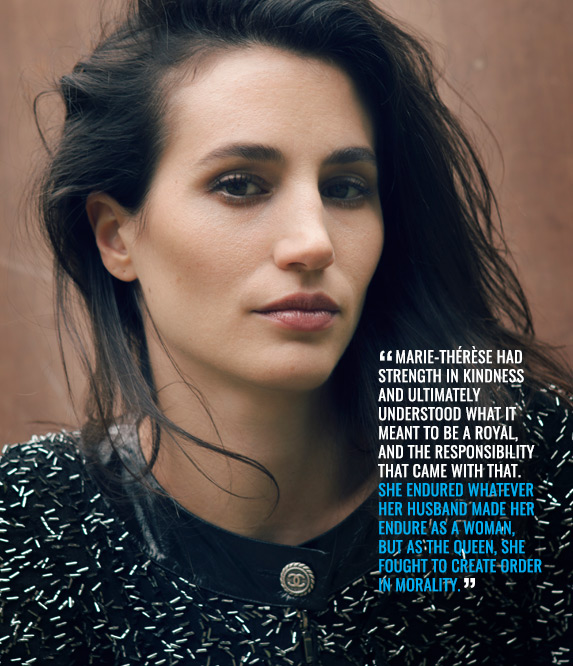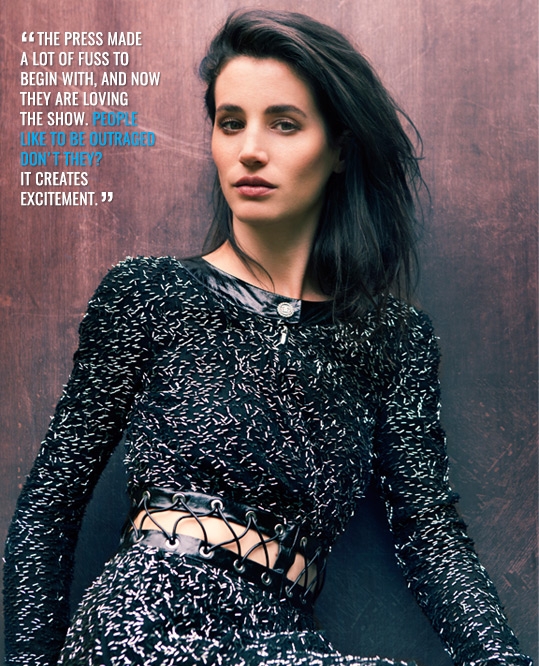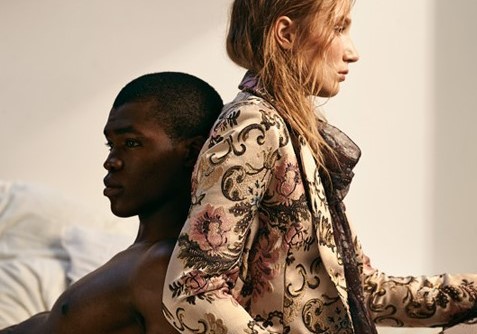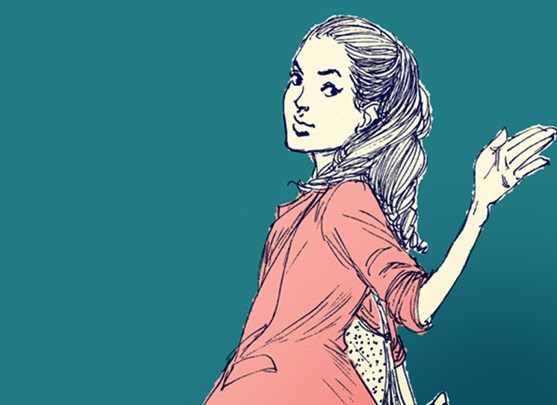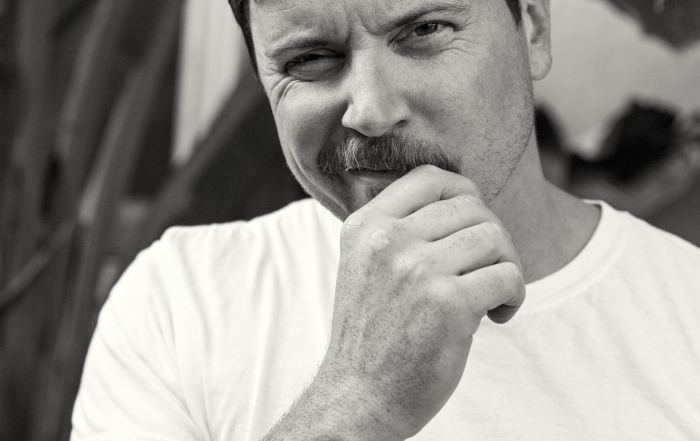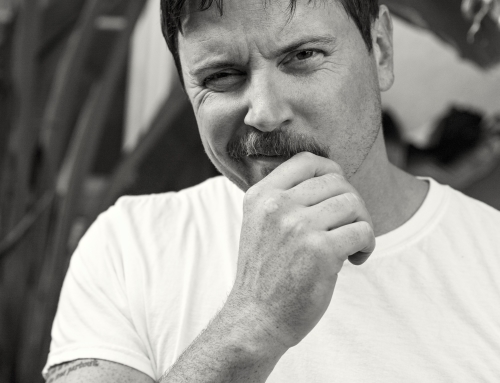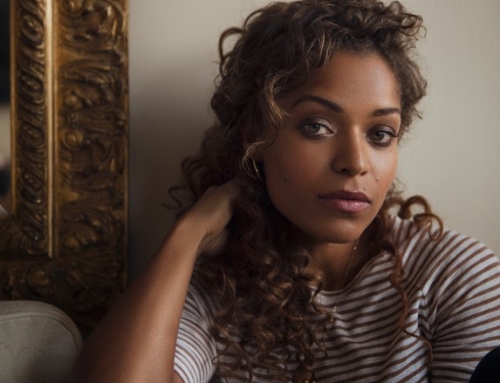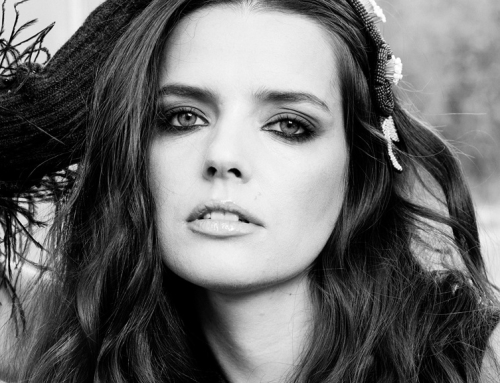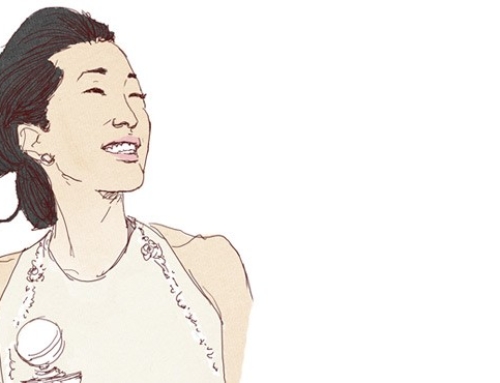“Louis XIV was the sun, and I believe Marie-Thérèse was the shadow,” concludes actress Elisa Lasowski. Cast in the role of the Spanish princess turned Queen of France in Versailles—a new series on Ovation, that launched across the pond on BBC Two earlier this year and will be headed to Netflix next—the French-born Lasowski has a unique perspective into the life of Louis XIV’s (played by former Vikings star, George Blagden) reticent first wife.
Enigmatic in her reserve, Lasowski effortlessly inhabits Marie-Thérèse, and through the vision of series creators Simon Mirren and David Wolstencroft, sheds a new found light on the misunderstood royal, cast from the depths of history. “[Louis XIV and Marie-Thérèse] were complementary somehow—she contributed to creating balance. She was aware of what her husband was and [was] not a dupe, as some historians wrote.”
Like Downton Abbey before it, Versailles (which boasts twice the budget as its English predecessor) prefers to approach period drama from the evocative end of storytelling. A melodrama by every stretch of the imagination, this Franco-Canadian co-production helmed by Canal Plus—the cable channel premiered the series in France during the winter of last year, along with Canada’s Super Channel—dares to push boundaries, churning out provocative plotlines that refuse to shy away from the royal escapades of the day. (Transgressions in the privacy of the king’s chamber very much included.)
Centered around Louis XIV’s (otherwise known as The Sun King) reign and the building of Versailles, the series was for Lasowski a chance to brush up on her French history; a fringe benefit of the job, she rather enjoys. “Choosing to act for me was about storytelling and being able to look into various subjects you may not otherwise come across,” she explains. “It’s almost more of a cerebral thing—a study of human emotions and psychology.”
With filming for Season Two wrapped and preparations for Season Three underway (viewers on this side of the pond will have to patiently wait out the transatlantic delay), the actress has formed an intimate bond with her character, deducing the machinations of a woman that mystified French courtiers. “Marie-Thérèse had strength in kindness and ultimately understood what it meant to be a Royal and the responsibility that came with that,” she affirms. “She endured whatever her husband made her endure as a woman, but as the Queen, she fought to create order in morality.”
While having her face plastered on promotional materials, is still relatively new for Lasowski—who counts Versailles as her first major role—the actress is hardly new to the scene, having worked her way up from small roles in noteworthy film and television programs, including Eastern Promises (2007), Burnt (2015) and a guest spot on Game of Thrones (2013), in addition to critically acclaimed independent films, such as Somers Town, winner of best picture at the British Independent Film Awards in 2008. David Bowie fans will also recognize the actress from the late musician’s fantastical video, “Black Star,” one of the performer’s final music videos. “We didn’t know what the hidden symbolism behind the video meant, so the news of his death came as a shock and essentially shone light on what we were doing,” says the actress. “I just feel so grateful and lucky to have contributed to telling a little bit of that story.”
VIEW GALLERY
Lasowski’s dedication to acting speaks to a love of the performing arts in general. Beginning dance at a young age and later acrobatics, she developed the drive necessary to survive the highly competitive world of acting, early on in life. From acrobatics, she declares she learned that, “performance is about ‘going for it.’ Much like when you prepare to do a flip, you have to commit to the jump entirely because if you only half do it, you’ll break your neck!”
While more a serious, actor’s actor type—“I am interested in transformation. I’ve done a lot of naturalistic work, where I’ve improvised different versions of myself, but the more I evolve in my work, the more I care about transformation and construct”—five minutes with her on set and it’s also apparent that Lasowski has an easy laugh and a lighthearted sense of humor, traits that come through as she relays a story from the premiere of Versailles.
The story begins during a special screening of Versailles (in the Palace of Versailles itself, of course), when the actress met French president François Hollande. She recounts, “he shook my hand and asked me how it was like to govern a country. I said I was handling it just fine. [With] France taking pride in being a Republic, in retrospect, I think I should probably [have] added ‘long live monarchy’.”
As charming one-on-one as she is intriguing on screen, Lasowski has us captivated. Below, we get to know Versailles’s mysterious Queen of France and the actress behind humanizing her royal plotline.
Versailles recently premiered on Ovation and is coming soon to Netflix; how do you expect audiences this side of the pond to respond to the show? Do you think it will interest them as much as its captivated European audiences?
I hope so! I suppose historical intrigue, adventures and entertainment are universal themes that catch a lot of people’s interest. Historical drama is a popular genre, and what most people know about French History abroad, often relates to The Sun King and Napoleon, so I think we’ve got a good subject.
Do you think North American audiences will react in a similar way that some of the British press did, in regards to the more explicit scenes in the series?
Versailles has sex [and] adventure. It’s an English language show produced by France, it’s a new show, its history with just a little fiction, it has new up-and-coming actors; all of these elements create a perfect environment for press to feel the right to express an opinion and criticize.
Why do you think that is?
What they are doing is testing us, and actually that’s great. We are giving them lots to talk about. Audiences may react to some of the elements of the show that are more explicit, and yet Versailles exists at a time in the history of television where that has been done before. It doesn’t come out of nowhere and in that respect, it is a contemporary show—of its time.
Why then do you think there was such a fuss in the British press about the show’s more explicit elements.
The press made a lot of fuss to begin with, and now they are loving the show. People like to be outraged don’t they? It creates excitement. There may have been an element of provocation in how the show was created, but really and truly, the sex in the show is part of the politics of the piece.
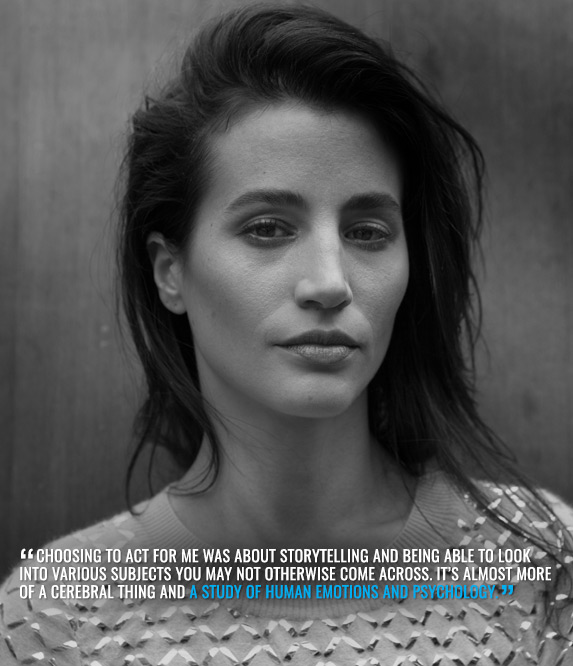
Part of the overall plot, you mean?
Versailles explores two main themes: Louis XIV rising power in Europe, symbolized by the construction of the castle of Versailles and explored through some of the rivalry with his brother. And the internal politics: the debauchery versus moral order and what that meant in the eyes of religion and royal responsibility.
We’re hooked already! The costumes featured in the series are incredible. Do you find wardrobe helps enliven your performance as Queen Marie-Thérèse?
Costumes help [get one] into character in the same way that dressing up in the morning—whatever you wear—will make you feel a certain way. On a daily basis however, we tend to pick and choose what we wear depending on our mood. At work, you get back thrown back into a mood the minute you put your costume on. Whatever we have created in terms of atmosphere and character is re-experienced immediately when you dress.
On that note, what is your personal style like off-camera?
On a daily basis: jeans, t-shirts and sneakers. Simple. I like, J.W.Anderson [and] what he did for Loewe too. Who wouldn’t? It’s modern [and] fresh. In general, good style to me is when it is entirely effortless and understated.
Every role presents its own set of challenges, what would you say those are with Versailles?
Versailles‘s challenge for me is the fact that it’s a period drama. The only way they work, in my opinion, is if they feel real as opposed to theatrical. Playing a queen is tricky, too. Two years of filming down the line [and] to conceive someone with that much power is still hard for me to understand!
What actors do you admire, and what qualities would you say they all share?
There are many actors I admire for different reasons, but the ones I like most share a quality that links with humanity, the realist ones to me are those who are profound and somehow caring… even if they play someone really dark.
Last question, how important is a stage persona to you as an actor?
I think stage persona entirely makes sense for a performer in music, but I am undecided about whether is it important for an actor. Yet, I often think of Marilyn Monroe… she created a character—a persona—and built her career on that. In a sense, she created a product: The Marilyn.
Yes, that’s very true.
I am just not sure if being defined as a specific character is in the spirit of transformation, which makes me wonder, if in order to be believable as different characters as an actor, the rest of your presentation should remain free of associations? And yet, the Marilyn Monroes of this world create something that is truly definable and that is genius.








